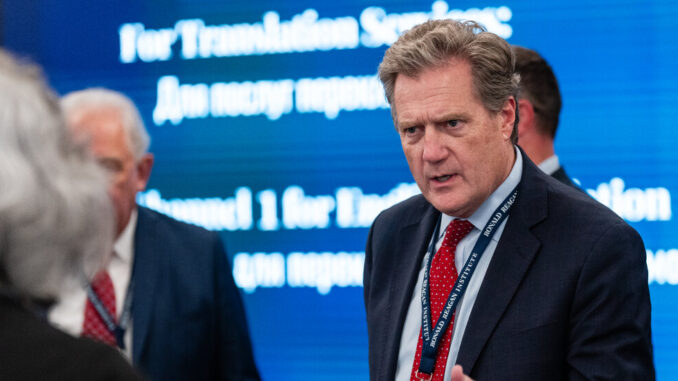
Speaker Mike Johnson on Wednesday removed Representative Michael R. Turner of Ohio from the helm of the House Intelligence Committee, in a shake-up that signaled he intends to align the pivotal national security panel more closely with President-elect Donald J. Trump.
Mr. Turner, who emerged from a meeting with the speaker on Wednesday afternoon looking furious, has told people that Mr. Johnson informed him his ouster was the result of a request from Mr. Trump’s Mar-a-Lago estate in Florida, according to a person familiar with those conversations.
The president-elect has long been suspicious of the intelligence community, claiming that its members were part of a politicized “deep state” that was out to get him. In jettisoning a Republican seen as insufficiently loyal to Mr. Trump, Mr. Johnson appeared to be paving the way for the president-elect to have tighter control over the committee that oversees intelligence matters.
Mr. Turner, a mainstream conservative who has represented southwestern Ohio in the House for more than two decades, has at times been critical of Mr. Trump’s actions. He broke with the majority of his party on Jan. 6, 2021, and voted to certify Joseph R. Biden Jr.’s 2020 election. He has also been a leading proponent of supporting Ukraine in its fight against Russia, breaking with the “America First” stance of the president-elect and many others in his party.
Mr. Johnson on Wednesday denied that Mr. Trump had been behind the decision to strip Mr. Turner of his chairmanship.
“This is not a President Trump decision; this is a House decision,” Mr. Johnson told reporters on his way out of the Capitol on Wednesday evening, adding that he had “nothing but positive things” to say about Mr. Turner.
He said that the panel “needs a fresh start, and that’s what this is about — nothing else.”
A spokesman for Mr. Johnson declined to say whom he planned to appoint as Mr. Turner’s replacement, though the announcement may come as soon as tomorrow.
By removing him as chairman, Mr. Johnson effectively kicked Mr. Turner off the committee altogether, since his decade on the panel exceeds the six-year limit that applies to rank-and-file members. He became the senior Republican on the Intelligence Committee in 2022, and took over as its chairman the following year, after the G.O.P. won the majority.
Mr. Johnson is now positioned to reshape the panel even more. The impending departures of Representatives Elise Stefanik of New York and Michael Waltz of Florida, who are expected to join the Trump administration, and other members who are hitting term limits, will create additional vacancies.
The speaker has a track record of appointing Trump loyalists to the committee. Last year, he blindsided Mr. Turner by appointing Representatives Ronny Jackson of Texas, Mr. Trump’s former White House physician, and Scott Perry of Pennsylvania, the former leader of the House Freedom Caucus.
While both those men have been outspoken allies of Mr. Trump, Mr. Turner has on several occasions spoken critically about the president-elect. He criticized Mr. Trump for a 2019 phone call with President Volodymyr Zelensky of Ukraine in which he pressured the Ukrainian leader to investigate the Biden family.
“I want to say to the president: This is not OK,” Mr. Turner said during an intelligence panel hearing. “That conversation is not OK.”
He also challenged Mr. Trump’s assertion that people imprisoned for participating in the Jan. 6 riot at the Capitol were “hostages,” though he has maintained that Mr. Trump did not direct his supporters to attack Congress. And he has said in television interviews that Mr. Trump’s decision to store classified documents at Mar-a-Lago after leaving office was “of grave concern” and “equally egregious” as the allegations about Mr. Biden’s handling of classified documents.
Mr. Turner and Mr. Johnson also have clashed on various areas of policy. They sharply disagreed about whether it was prudent to continue sending military aid to Ukraine, something Mr. Turner pushed for and Mr. Johnson resisted.
They also appeared to be at odds over how to renew Section 702 of the Foreign Intelligence Surveillance Act, which legalized a form of the warrantless surveillance program that was started after the terrorist attacks of Sept. 11, 2001. The intelligence community maintains that the program has helped to protect the United States from terrorist attacks, but many of Mr. Trump’s allies argue that it has been misused to spy on conservatives.
Mr. Turner was highly regarded by his Democratic colleagues for reinstituting a spirit of bipartisanship on the intelligence panel, something that had been decimated during Mr. Trump’s first term, when former Representatives Devin Nunes, Republican of California, and Adam B. Schiff, Democrat of California — and now a senator — frequently clashed.
Representative Jim Himes of Connecticut, the top Democrat on the panel, told reporters Wednesday evening that Mr. Turner’s removal “sends a shiver down my spine.”
Later, in a statement, he said: “The removal of Chairman Turner makes our nation less secure and is a terrible portent for what’s to come. The Constitution demands that Congress function as a check and balance to the executive branch, not cater to its demands.”
Carl Hulse contributed reporting.


Be the first to comment